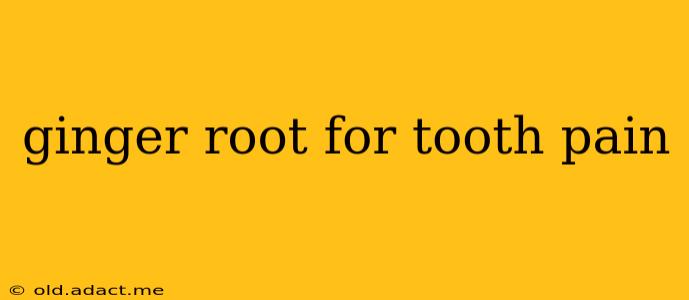Tooth pain is a common ailment, and while a dentist should always be consulted for persistent or severe pain, many people explore natural remedies for temporary relief. Ginger, a spice with a long history of medicinal use, is one such remedy often suggested for easing toothaches. But does it actually work, and how effective is it? Let's delve into the science and explore what we know about using ginger root for tooth pain.
What are the active compounds in ginger that might help with tooth pain?
Ginger's potential pain-relieving properties are largely attributed to its bioactive compounds, primarily gingerols and shogaols. These compounds possess anti-inflammatory and analgesic (pain-relieving) effects. These properties work by inhibiting the production of inflammatory molecules and interfering with pain signaling pathways in the body. While the exact mechanisms of how ginger affects tooth pain are not fully understood, its overall anti-inflammatory and pain-reducing characteristics make it a potential option for some individuals.
Does ginger really work for toothaches?
While anecdotal evidence suggests ginger can provide temporary relief from mild tooth pain, scientific research specifically on its effectiveness for toothaches is limited. Many of the studies on ginger's analgesic effects focus on other types of pain, such as muscle pain or menstrual cramps. Therefore, we can't definitively say that ginger is a guaranteed solution for every toothache. Its effectiveness might vary depending on the cause and severity of the pain.
How can I use ginger for tooth pain relief?
If you're considering trying ginger for tooth pain, several methods can be used:
-
Chewing on a small piece of fresh ginger: This allows the gingerol and shogaol compounds to come into direct contact with the affected area. The gentle chewing action can also help dislodge any food particles contributing to the pain.
-
Ginger tea: Steeping ginger in hot water creates a soothing tea that can be sipped and swished around the mouth. The warmth can provide additional comfort.
-
Ginger paste: You can create a paste by grinding fresh ginger into a pulp. This paste can be applied directly to the affected tooth and gum area.
Important Note: These methods are intended for temporary relief only. Do not use ginger as a replacement for professional dental care.
What are the potential side effects of using ginger for tooth pain?
Generally, ginger is considered safe for most people when consumed in moderate amounts. However, some individuals may experience side effects, such as:
- Mouth irritation: The pungent nature of ginger can sometimes irritate sensitive mouths or gums.
- Allergic reactions: Although rare, allergic reactions to ginger are possible.
- Interactions with medications: Ginger can interact with certain medications, so it's important to consult your doctor or dentist if you are on any medication.
Is it better to use ginger for tooth pain or see a dentist?
Always consult a dentist if you are experiencing tooth pain. Ginger may offer temporary relief from mild pain, but it cannot address underlying dental issues such as cavities, abscesses, or gum disease. Delaying professional dental care can lead to more severe problems and increased pain in the long run. Ginger should be considered a complementary therapy, not a replacement for professional dental treatment.
Can ginger cure tooth infections?
No, ginger cannot cure tooth infections. Tooth infections require professional dental care, often involving antibiotics or other treatments. Using ginger alone will not eliminate the infection and may delay appropriate medical intervention.
How long does it take for ginger to relieve tooth pain?
The time it takes for ginger to provide relief, if any, varies from person to person. Some may experience immediate relief, while others may not notice any difference. If you don't experience relief within a reasonable timeframe, you should consult a dentist.
What other home remedies can I use for tooth pain?
Besides ginger, other home remedies sometimes used for temporary tooth pain relief include salt water rinses, clove oil, and cold compresses. Again, these are for temporary relief only and should not replace professional dental care. A dentist can properly diagnose the cause of the pain and recommend the most effective treatment.
Remember, while ginger might offer temporary relief from mild toothaches, it's crucial to seek professional dental care for persistent or severe pain. Early diagnosis and treatment of dental problems are key to preventing further complications.
